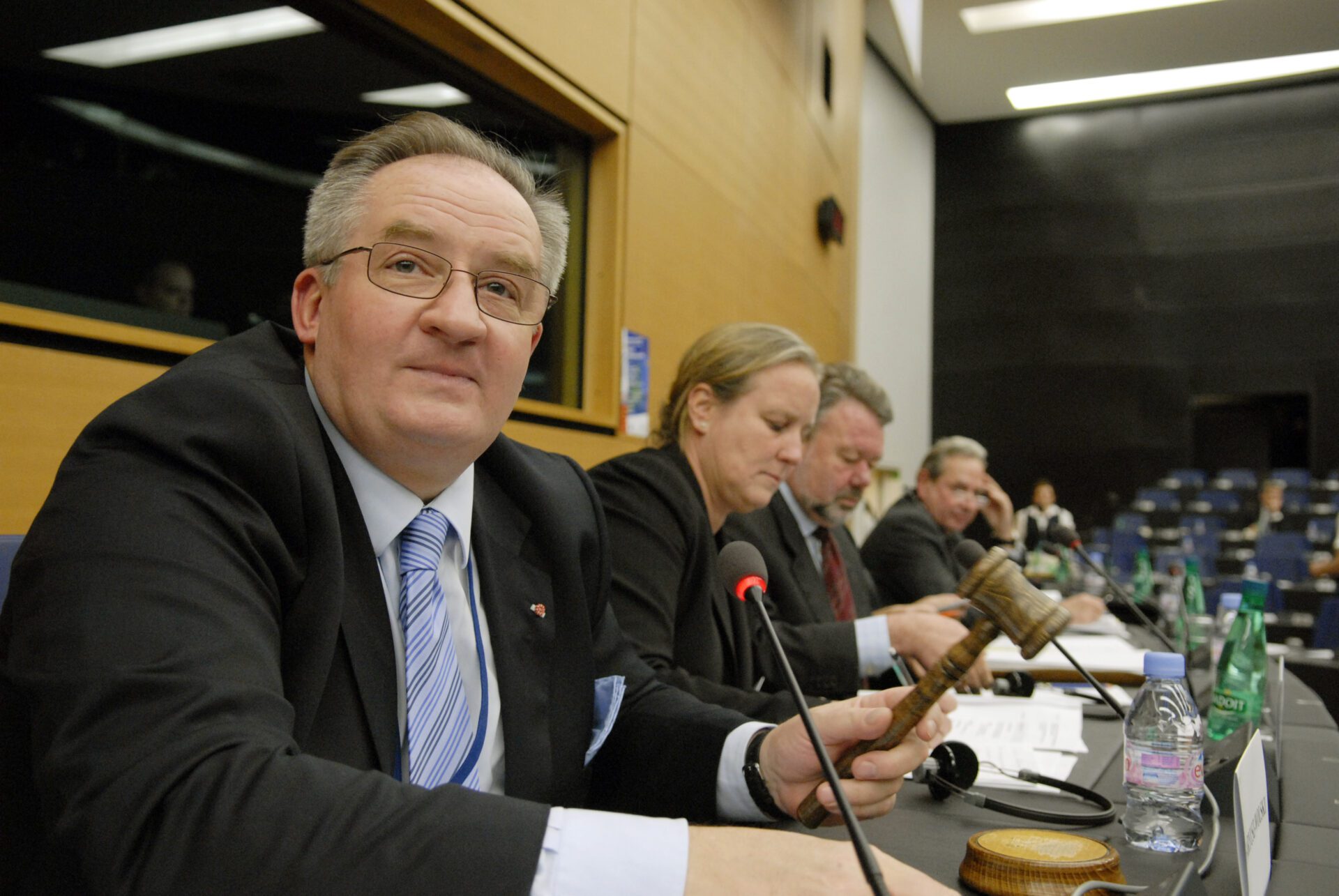Polish co-rapporteur warning against European Parliament resolution on treaty reform (interview)

Even the constitutional treaty rejected in two referendums, in the Netherlands and France, was finally forced through in truncated form as the Lisbon Treaty, says MEP Jacek Saryusz-Wolski. And today, the tools of pressure and blackmail in the hands of the European Commission are much more powerful – capable of forcing into submission those who would resist the treaty changes supported by the European Parliament as well as France and Germany. This is why we need to react now, before the EU treaty change steamroller gets too far.
ECR MEP Jacek Saryusz-Wolski was one of six co-rapporteurs working in the European Parliament’s Constitutional Affairs Committee on a report on proposals of the European Parliament for the amendment of the treaties, before he slammed the door in an act of protest, being systematically outvoted by the five other co-rapporteurs under the leadership of the Belgian MEP Guy Verhofstadt. Saryusz-Wolski was one of Poland’s main negotiators for membership in the European Union and was in charge of relations with the EU in several governments in the 1990s and early 2000s. He talked to Olivier Bault for the Polish Do Rzeczy weekly.
***
The European Parliament has been working on a profound change to the Union’s treaties, which would entail a massive transfer of national competencies to Brussels. In Poland, Donald Tusk himself has expressed far-reaching skepticism about the changes, and PSL MP Marek Sawicki, who has been appointed provisional speaker of the Sejm by President Andrzej Duda after the Oct. 15 elections, has said he will try to convince his colleagues in the European Parliament to vote against them at the November 22 plenary session. You took part in the negotiations on the report and the draft EP resolution on treaty changes. Having insider knowledge, you have been raising the alarm in the media against the proposed changes, which have the backing of Germany and France and the five “Grand Coalition” groups – from the EPP to the far left – in the European Parliament. Do you think that even if it is Donald Tusk who forms the next Polish government, Poland will oppose these changes?
No, I do not think so. First, Mr. Tusk’s words mean nothing. He has lied and failed to keep his word so many times that what he has said now should not be taken seriously. Second, his political group at EU level, that is, the European People’s Party (EPP), to which both Donald Tusk’s Civic Platform (PO) and the PSL belong, has already voted in favor of the changes. It voted for them through its representatives both in the European Parliament’s Constitutional Affairs Committee and in the so-called Verhofstadt Group, which drafted these proposals for treaty changes.
In September this year, it also voted for them in a plenary vote on another report on whether we want changes to the treaties and the elimination of member states’ power of veto on key issues. Since they have voted for these measures in the past, it is practically certain that they will continue to vote that way.
And in any case, their political patrons in the EU will see to it. They are tied to their EU-German bosses, and whatever they say, they will still follow orders from Berlin and Brussels. By saying they are opposed to the treaty changes, they are just trying to pull the wool over our eyes. PSL politicians are instinctively pro-state, and that makes them naturally cautious and skeptical of the centralist ideas of the EU system. Even in their case, however, in a coalition with Tusk they will not have the opportunity to defend their position, because they will be a junior partner and will simply be either pressured or outvoted. The prime minister will have the final say, as he will represent the eventual new government in this matter, not the PSL.
I would also caution against using the term “federalism” to describe the proposed reform. This is not about federalism at all, but about creating a hierarchical superstate, a kind of empire. In a federation, the constituent parts are equal or nearly equal. The Länder in Germany, the cantons in Switzerland or the states in the US have the same or similar number of votes in the upper house of the federation’s parliament. In the European Union, the opposite is true: The larger the country in population, the more it weighs. Therefore, it can be said that the draft treaty change is actually anti-federalist. These are not Eurofederalists, but Eurocentralists.
The new areas where the member states would have to hand over their authority and submit to the exclusive competence of the Union are climate and environment. What kind of cars Poles can drive and where they can drive, whether they will have to pay CO2 allowances for heating their homes, and many other matters of consequence will no longer be decided in Warsaw, but in Brussels, by a simple majority vote?
Yes, and this really means that decisions about climate and environmental issues will be imposed by the European Commission, as is the case in areas where the EU already has exclusive competence, like for the common trade policy. This will be the most radical version of the green policy, the so-called Green Deal, which Dutchman Frans Timmermans wanted to impose. And since the draft amendments to the treaties involve lowering the threshold for votes in the Council from 55 percent of countries, comprising 65 percent of the EU’s population, to 50 percent of countries, comprising 50 percent of the EU’s population, pushing through the Commission’s proposals will be easier, and blocking anything will be more difficult.
On top of that, there are new shared competences that actually become EU competences, since the treaty says that the EU has priority to exercise such competences. Member countries can only exercise them to the extent that the Union chooses not to. Therefore, they are not much different from exclusive competencies. So we should say there are not two, but 10 new areas of competence that will be transferred to EU level if the proposed changes come into force.
Among the new shared competences are public health and education. Are we to understand that so-called reproductive health, i.e. abortion, or, for example, the introduction of sex education in accordance with the highly controversial WHO sex ed guidelines for Europe from kindergarten to high school, will be decided by majority vote in Brussels and will have to apply also in Poland without the consent of the Poles?
This is what will happen, knowing the Brussels method of expanding the interpretation of everything that is written in the treaties. When it comes to health care, for example, the following are mentioned as new areas of shared competences: “public health matters and the protection and improvement of human health, especially cross-border health threats.” Since abortion is disguised in the EU under the codename “reproductive health,” it will be treated as part of health policy and will be decided as a shared competence, for which the Union has priority. The same goes for the other shared competences mentioned in the draft treaty amendments: forestry, cross-border transport infrastructure, external border policy, foreign affairs, external security, defense, civil protection, industry, and education.
We also read in the proposed Amendment 118 to the Treaty on the Functioning of the European Union that family law issues will be decided by a simple majority, rather than unanimously. So it is certain that if the new treaty comes into force, Poland will have to introduce “gay marriage” with the right to adopt children, right?
Yes, because the right of veto is eliminated, with one important exception: the decision to admit a new country to the Union. Besides, everywhere in the treaty, i.e. in dozens of places, the concept of “equality of men and women” is being replaced with the ideological concept of “gender equality.” This heralds a cultural and ideological revolution, in which Brussels will impose its solutions on member states. If a country fails to comply, under the amended Article 7 it will henceforth be possible to deprive it of not only voting rights, but also funds. Besides, majority voting will replace the current unanimity minus one requirement to sanction a member state under Article 7.
And the euro is to become mandatory in the whole EU…
Exactly, yes. The revised Article 4 of the Treaty on European Union will state that “the currency of the Union is the euro.” This means that all of the Maastricht convergence criteria, which require the fulfillment of conditions of objectively measured economic maturity for a country to adopt the euro, concerning the level of inflation, interest rates, budget deficit, exchange rate, and the level of public debt, will be treated as secondary to the treaty requirement. Since the Union’s currency is the euro, it will be possible to impose the adoption of this currency on member states regardless of whether an economy is ready to join the monetary union, and regardless of the political will and provisions of a country’s constitution.
According to statements made by some of the co-rapporteurs of the European Parliament report containing the proposed amendments, the goal of achieving the “strategic autonomy of the Union” along with the transformation of the armed forces of the EU countries into European structures should in the future allow the EU to become independent of NATO. Such was the position expressed by German MEP Helmut Scholz of the GUE/NGL group. In your opinion, could the revised treaties actually threaten NATO’s existence or at least weaken the Alliance by pushing the Americans out of Europe?
In the long term, this is the intention. Strategic autonomy is a code word for distancing ourselves from the US. The EU, by acquiring military capabilities on its own, would become an alternative to NATO, rather than its economic, civilian, and infrastructure complement, as has been the case so far. This plan is impossible to implement in the foreseeable future, due to the weakness of Europe’s industrial and high-tech military base as well as the extremely divergent interests of EU countries in foreign and security policy. It is a pipe dream, but it could damage transatlantic and NATO relations. Especially since behind it is the geopolitical intention of Germany and France that the EU should maintain an equal distance between the US and Russia, and resume collaboration with Russia “as it is” in order to create a counterweight to the US. This plan for a Europe from Lisbon to Vladivostok is old but still very much alive. It poses a deadly threat to Poland, alongside the whole of Central and Eastern Europe, which would find itself in a tectonic crumple zone between the German EU and Russian Eurasia. It is also a complete reversal of the structural principle that underpinned the transatlantic community and NATO after World War II: “Keep America in, Russia out, and Germany down.” Now it would be: “Keep America out, Russia in, and Germany up.”
On the other hand, even if Poland does not block the treaty changes that are being pushed through, won’t there always be some country that will block the new treaties anyway? This is what happened in the past…
The history of the constitutional treaty shows that at the end of the road, all resistance is crushed. Even Britain, the most euroskeptic and euroresistant of all, eventually agreed to the treaty, and had it not been for referendums in the Netherlands and France, the constitutional treaty would have passed. And after all, a truncated version of that treaty, called the Lisbon Treaty, was introduced anyway. History teaches that all those who resist can be broken. Besides, today’s tools of pressure and blackmail are much more powerful. Back then, the Commission did not have at its disposal such instruments to force member states into submission. It could not so easily blackmail countries by blocking multibillion-euro funds, as it does now, for example, under the pretext of the so-called rule of law. Such a financial blockade could put debt-laden countries like Italy at risk of financial disaster, exposing them to attack by financial markets.
For this reason, it can be assumed that this radical, revolutionary political change may well succeed, unless public opposition is built up now and it translates into political action to form a coalition of states opposing such changes to the treaties. If we fail to act now, it might soon be too late.
And from a Polish point of view, shouldn’t Poles be asked about the treaty changes in a referendum, just as they were before joining the Union in 2004?
Certainly the change is so radical that it should trigger a new referendum. This is, after all, a decision of the same importance, if not more. France, on the other hand, which has its own experience with the constitutional treaty, has changed its constitution to prepare for a time when a new treaty is introduced, which its leaders have been longing for. So in France, a referendum is no longer required on this issue. In Germany, referendums are actually banned by the Basic Law. A referendum is constitutionally required only in a very small number of countries. Anyway, the media silence on the subject indicates that the elites intend to push this through at the government and parliamentary level, avoiding publicity, quietly, outside the public’s awareness and knowledge.
Now that it is happening, my parliamentary assistants have been looking for information about it in the Western European press: Except for some specialized texts in remote places, there is complete silence on this issue. And the stake is, after all, the eventual de facto abolition of nation-states. In Poland, a referendum would be fully justified, because the proposed treaty change is even more important than our accession to the EU itself, of which I was a negotiator. But a referendum would also produce a dangerous trap. The issue could be presented to an uninformed public as a choice of “to be or not to be” in the EU. And then, with the very pro-EU attitude of Polish society, alongside well-prepared media manipulation and social engineering, anything could happen.
Then what? Lisbon or death? Just like the Poles once said “Nice or death” when the discussion was about abandoning the Treaty of Nice in favor of the current Treaty of Lisbon?
That slogan “Nice or death” was misunderstood and ridiculed at the time. I was its author, while its political propagator was [Civic Platform MP] Jan Rokita. The abandonment of the Treaty of Nice was the first stage of a shift away from Community rules, with a fairly equal weighting of member states’ votes, to a population-based system, the so-called “double majority” voting system. And it gave birth to this system, which we could call a directorate, a group holding power, a German–French duopoly plus, or a concert of powers, which has broken with communitarian politics and begun to pursue imperial-neocolonial, centralist, treaty-violating policies. All the evil began the moment we walked away from Nice.
I stand by Robert Schuman’s idea, inspired by Christian values, that the European Union is to be a community of sovereign states. I am fighting the concept of Altiero Spinelli’s Communist Ventotene Manifesto, which envisioned the creation of a superstate, abolishing and taking away from the people their national communities. It is proposed that the European Commission be called the Executive and the commissioners be called secretaries. These are all Bolshevik ideas and Bolshevik terms. As we read in the Ventotene Manifesto, which is referred to in the first place in the European Parliament’s resolution on treaty changes: “It derives its vision and certainty of what must be done from the knowledge that it represents the deepest needs of modern society and not from any previous recognition by popular will, as yet inexistent. By this dictatorship of the revolutionary party a new State will be formed, and around this State new genuine democracy will grow.”
This is pure Sovietism!
This interview was first published in Polish in the Do Rzeczy weekly in November 2023



